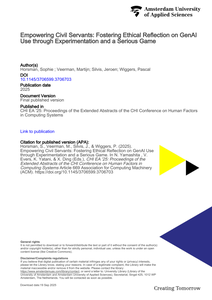While there is much focus on interventions to foster ethical reflection in the design process of AI, there is less focus on fostering ethical reflection for (end)users. Yet, with the rise of genAI, AI technologies are no longer confined to expert users; non-experts are widely using these technologies. In this case study in a governmental organization in the Netherlands, we investigated a bottom-up approach to foster ethical reflection on the use of genAI tools. An approach of guided experimentation, including an intervention with a serious game, allowed civil servants to experiment, to understand the technology and its associated risks. The case study demonstrates that this approach enhances the awareness of possibilities and limitations, and the ethical considerations, of genAI usage. By analyzing usage statistics, we estimated the organization’s energy consumption.
DOCUMENT

Lawmakers as representatives of the people should resist the anti-competitive proposals of the banking sector and embrace a vision of the digital euro that serves the collective interests of Europeans, Dr Martijn van der Linden and Vicky Van Eyck write. The influence of the banking lobby on policymakers risks undermining the digital euro's potential. Lawmakers as representatives of the people should resist the anticompetitive proposals of the banking sector and embrace a vision of the digital euro that serves the collective interests of Europeans. This means that the digital euro must be attractive, accessible and beneficial to all. The deliberation process must be free from the disproportionate influence of an industry that has much to lose from a level playing field for payment services and financial intermediation.
MULTIFILE